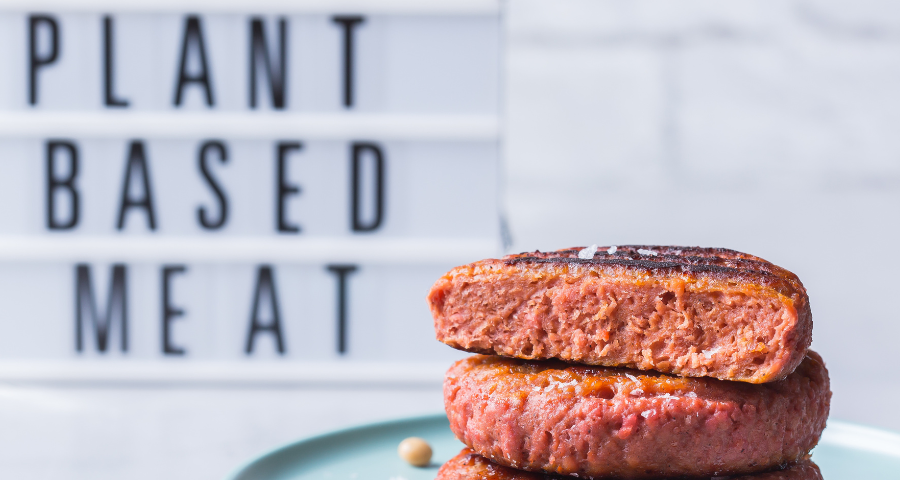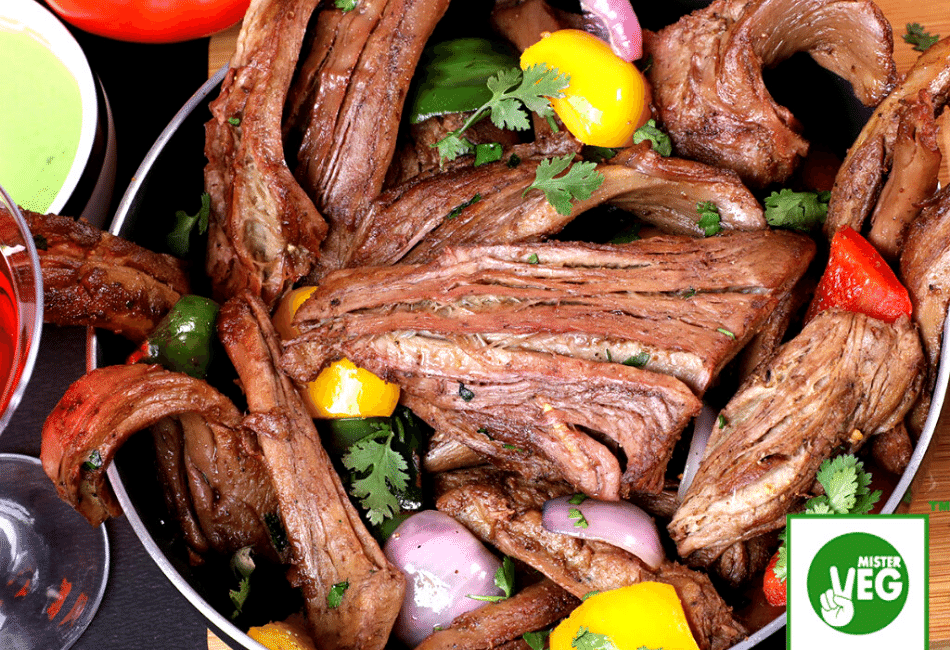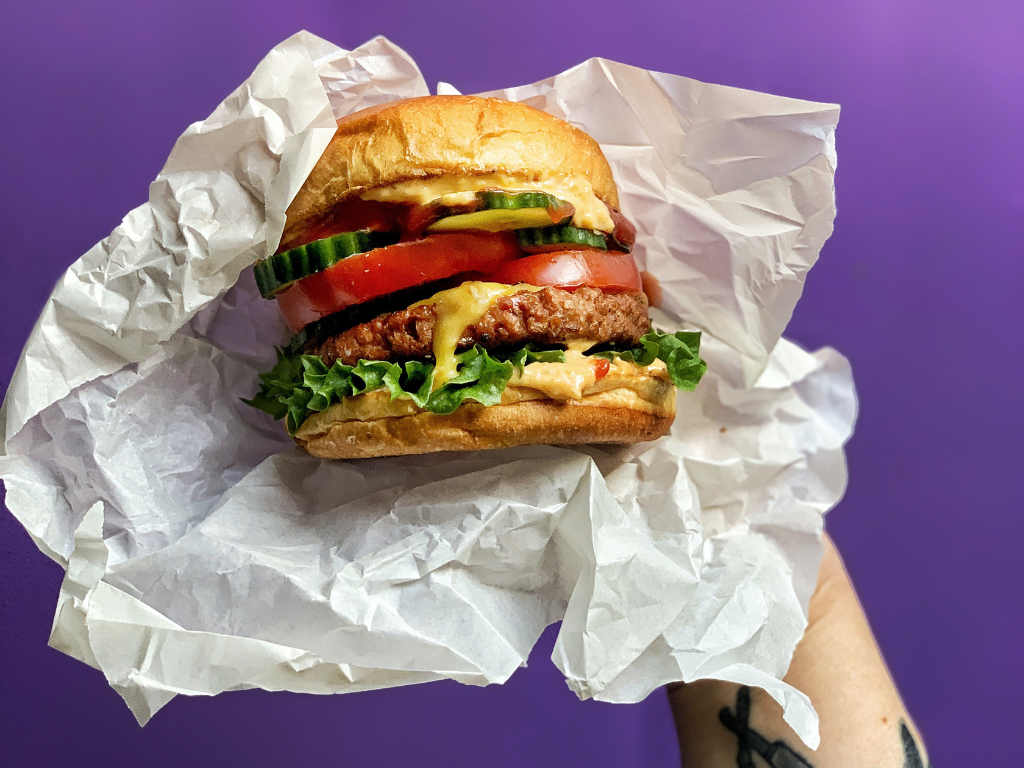Download Free Vegan Starter Kit -

Why is the B2B segment the current favourite of plant-based meat brands?
April 12th, 2023
Have you tried the Vegan Sausage Croissant Rolls, Vegan Hummus Kebab Wraps and Vegan Croissant Buns at Starbucks? Interestingly, each of these plant-based options is made using products from plant-based meat brand Imagine Meats.
Elsewhere, Unilever’s meat alternative brand The Vegetarian Butcher is also using the B2B route by partnering with fast food chains such as Burger King, Domino’s, etc.
So is the alternative meat industry leaning towards the B2B route now instead of focusing only on D2C or retail? Let’s find out.
Main Sales Channels
Following are the sales channels currently available for mock-meat brands in India:
1. B2B via HoReCa
The HoReCa segment contributes more than 7% to India’s GDP. In the past, Sohil Wazir, COO at vegetarian meat brand Blue Tribe had said that the buy-in of the HoReCa segment is important for the growth of the vegan F&B category in India as he believes they are key opinion leaders for food.
The segment can be further split into:
- Organised and unorganised
- Commercial and institutional
It is this versatility along with the substantial size of the HoReCa segment that is a big draw for plant-based meat brands. We will do a deeper dive into other reasons for this segment’s appeal later on.
2. B2C
B2C for the vegetarian meat industry refers to the traditional retail distribution model consisting of modern trade, general trade, e-commerce marketplaces and specialty retailers like Vegan Dukan or Nature’s Basket, etc. Despite lower margins, meat-free brands use this model because it gives them exposure to a larger set of customers. It also allows for wider distribution and better supply chain logistics.
3. D2C
Most alternative protein brands would love to get more of their sales directly from consumers, without intermediaries. As Karan Bajaj, co-founder of jackfruit-based vegan meat brand Eat With Better explained, “D2C is definitely an ideal choice. It offers better margins, helps track the entire customer journey, and gives better data.”
He also rightly said that the discoverability of an alternative meat brand is higher in D2C through hyper targeted digital ads. But given how expensive it is right now, it is not a viable option for plant-based substitutes since most are still in the startup phase.
Why is the plant-based meat market leaning towards B2B?
1. B2B needs lesser customer education
Being a nascent and evolving category, the alternative protein industry doesn’t yet have enough pull-among consumers. It is struggling to educate and has to use the ‘Push’ (instead of ‘Pull’) strategy to make even a little dent among Indian consumers.
Sairaj Dhond, founder and CEO of vegan meat brand Wakao Foods, hit the nail on the head when he said, “The whole category of plant-based is still evolving. It will have to continue to do so till it becomes a mass product and matures in the minds of Indian consumers. Until that happens, selling on D2C is very difficult. Because the entire plant-based category is like an invention for India. People are just starting to warm up to the category.”
In comparison, in the B2B route, plant-based substitutes only have to interact with chefs who are already culinary experts. Isn’t it easier to talk to an expert than to a beginner? Sairaj from Wakao wholeheartedly agrees. “For Wakao, a lot of chefs know what jackfruit is and what to make with it.”
2. Larger audience base can be targeted pan-India
Wakao Foods supplies jackfruits to almost 150 restaurants across India. Such widespread HoReCa presence allows a startup vegan meat brand to put a massive foot in the door within a relatively short period of time.
3. Faster go-to-market strategy
B2B allows plant-based substitutes to fight one battle at a time i.e. getting consumers to enjoy the product instead of also trying to build a brand. It also helps earn their trust as a newbie besides doing category education.
Thus, becoming a manufacturer or ingredient for an already established QSR brand, big packaged food brand or hotel chain is a shorter and faster route to the market.
Didn’t China adopt this strategy successfully? Earlier, China was only “the factory of the world”. Once it got street cred by making products for already popular brands while picking up enough learnings in brand building and product designing, the very same Chinese factories started launching their own private labels.
“While almost 80% of our sales is still in the B2C space, we believe the strongest tailwind in the space will come in the B2B and HoReCa space. Our B2C sales are on account of more than 5 years of hardwork in educating the consumers in our distribution network through sampling, cooking demos and awareness creation all across India,” says Abhishek Sinha, Co-founder and CEO at meat alternative brand GoodDot.
4. Predictable income and volumes
As Karan from Eat With Better rightly pointed out, HoReCa segment gives visibility on sales for the next few months. They give larger and almost consistent orders. That allows a vegan meat brand to have predictable income and volume.
5. Lower customer acquisition cost
B2C, including D2C, is prohibitively expensive. Abhishek from GoodDot explains, “To create large-scale awareness in the larger public domain requires significant capital towards sampling and branding exercise. For instance, even a global leader like Nestle had to run a pan-India campaign in schools across India to distribute free samples of Maggi and also conduct pan India contests and activations there.”
He further adds, “Plant-based meat is an entirely new category. Thus apart from awareness campaigns, large scale sampling, cooking demos, etc. need to be done to create awareness across the nation. This would entail significant capital investment. Until that kind of funding is there, it’s easier to collaborate at a B2B and HoReCa level to leverage the strengths of established food service players to provide consumers the best of plant-based products.”
Sairaj from Wakao Foods concurs. “D2C is a very expensive game. There is a lot of burn in it and it has to sustain.”
Karan from Eat With Better described this expensive side of D2C by calling it “a race to see who bleeds the fastest”.
6. B2B has more chances of repeat orders
As Sairaj mentioned, “Plant-based products have not yet become a habit. First purchases happen but repeats are difficult because people are not inclined to shift or change to plant-based substitutes easily.” Hence, getting enough and consistent repeat orders from D2C is difficult but from B2B it is relatively easier.
7. Co-branding allows for sampling
In 2021, Wakao did a sustainable food showcase spanning all the 18 Hilton properties across India, called “The Wakao Fest”. Hilton’s culinary experts came up with an innovative menu with Wakao jackfruit as the main ingredient.
With such prestigious collaborations under its belt, it’s no wonder that Sairaj believes “HoReCa is a fast and cost effective solution to get people to try our product. This could then translate into sales online or on D2C channels.”
Nicole Rocque, Senior Innovation Specialist, GFI India, has said in the past that food service allows “curious and conscious customers” an opportunity to try plant-based meats.
Conversely, adding plant-based dishes to the menu can help hotels, restaurants, and cafes attract new consumers, offer more inclusive group dining options, and appeal to younger demographics.
8. B2B focus increases export potential
To compete with the raw meat market, plant-based meat brands offer raw, unflavored chunks. Those are meant to fit seamlessly into any recipe or menu as ingredients or raw materials. That is why these ingredient SKUs are largely targeted at the HoReCa segment. Also, not every end user knows how to get the best out of a new ingredient.
Since B2B SKUs are already present, why not also explore exporting them to bigger global brands?
As per Good Food Institute, India, the total domestic market size for plant-based meat in 2030 ranges from INR 1,803 crore (USD 228 million) to INR 5,884 crore (USD 745 million) Surprisingly, the export potential for plant-based meat in 2030 ranges from INR 2,194 crore (USD 278 million) to INR 6,824 crore (USD 864 million).
So the export potential for Indian plant-based meats is higher than its domestic sale potential. And when we say export, it is primarily in the form of ingredients or as raw materials.
Conclusion
The prospects of plant-based meat brands within HoReCa are optimistically conveyed by Abhishek from GoodDot, “We envision that in the next 5 years, plant based meat will be as ubiquitous as paneer (cottage cheese) in the menus of restaurants/cafés/QSR chains and hotels all across India.” It will be interesting to witness how availability and demand for plant-based meat grows further in India.
AUTHOR

trending
Be a Vegan First Informer
Send us buzzworthy news and updates
related

Indian Company Mister Veg Sells More Than 40,000 Packets Of RTE And RTC Plant-Based Meals To Canada

- VeganFirstDaily
- 1.7 K
_(7)1.png)
Discover the "Shark Tank" startup that is transforming seaweed into vegan bacon

- VeganFirstDaily
- 1.7 K
_(2)2.png)
Evolved Foods wins the "Most Admired Organization in Plant-based Sustainable Foods" award

- VeganFirstDaily
- 2.3 K
Explore
Contact Us
About Us
Stay Connected
Copyright ⓒ 2017-2023. VEGAN PASSION PRIVATE LIMITED. All Rights reserved.
For more information, please write to hello@veganfirst.com
Registered Office Address: 55, 2nd floor, lane 2, Westend Marg, Saidullajab, Near Saket Metro Station, New Delhi, Gadaipur, New Delhi South West Delhi, DL

2.png)

.png)
.png)
2.png)
2.png)
2.png)

1.png)

_(5)3.png)
_(4)6.png)
